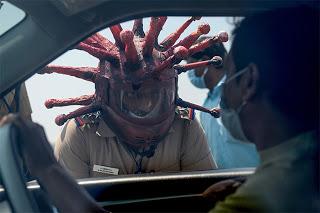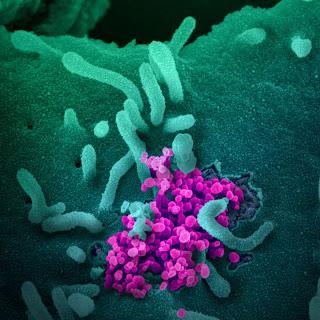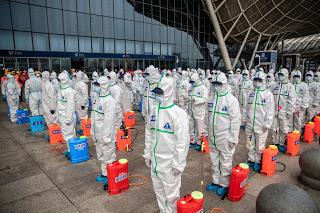 ACTIVIDADES COMUNITARIAS EN TIEMPOS DE PANDEMIA
Desde el momento en que empezamos a sospechar que teníamos casos de personas infectadas por Coronavirus en nuestra población entendí que me había dejado engañar por el sesgo de “esto no nos va a tocar a nosotros” que lamentablemente ha afectado a la gran mayoría de regiones, países y territorios.
La situación nos explotó en la cara cuando afectó de lleno a las tres residencias de ancianos del pueblo. Nunca nos habíamos enfrentado a algo de esta magnitud.
Tras la estupefacción inicial nos pusimos a pensar y había muchas cosas que no conseguíamos ver. ¿Cuál sería la mejor forma de organización? ¿Cómo ayudar a las residencias? ¿Cómo atender al resto de la población? ¿Cómo protegernos como profesionales sanitarios?
Entendimos que había que evitar que los ciudadanos siguieran viniendo al centro de salud, por su seguridad y por la nuestra y fuimos uno de los primeros equipos de Atención Primaria que consiguió vaciar sus salas de espera y pasar la asistencia a telefónica. Se establecieron circuitos y se modificó la organización pero seguíamos teniendo problemas: no había suficientes Equipos de Protección Individual (EPIs) ni para nosotros ni para las residencias, la comunicación con la institución era compleja con numerosos protocolos cambiantes pero sin claro liderazgo y veíamos mermados los recursos humanos con las lógicas bajas por enfermedad y la abducción de profesionales que eran reclamados en el nuevo hospital de IFEMA.
Tardamos varios días en darnos cuenta de que teníamos que pedir ayuda y lo hicimos con una visión comunitaria. Por un lado dentro de la organización tratamos de coordinarnos lo mejor posible con la dirección asistencial, el hospital de referencia, los servicios de geriatría... y de este modo se consiguió dar apoyo técnico y medicación a las residencias. Pero antes tuvimos que pedir socorro al ayuntamiento y vecinos por medio de llamadas telefónicas y redes sociales. Como en un principio no había mascarillas por ninguna parte tuvimos que compartir unas pocas de las nuestras con las residencias y ponerlas en contacto con las ferreterías del pueblo para que se aprovisionaran de monos plásticos y otros materiales. Los siguientes días nos donaron un termómetro infrarrojo, mandiles de plástico caseros, gorros de ducha, mascarillas caseras... y una tahona nos empezó a regalar pan, magdalenas y pastas lo que contribuyó a subir la moral del equipo.
Empezamos a hacer llamadas para mejorar la coordinación con las farmacias comunitarias, solucionando sus dudas técnicas de protección del personal y otras. Dando apoyo, planteando que las cuestiones burocráticas de errores de receta se arreglaran cuando la epidemia termine y dejando una línea de comunicación abierta en caso de necesidad.
Nos acordamos de nuestras colectividades y se comprobó que el albergue de acogida de inmigrantes estuviera a salvo. También contactamos con mezquitas e iglesias para interesarnos por ellas y garantizar que no hubiera riesgos, se nos garantizó que todas se mantenían cerradas.
Con servicios sociales coordinamos algún caso que habían detectado pero afortunadamente tenían cubierto el servicio de atención a domicilio y mantenían los demás programas de forma telefónica.
Las situaciones nuevas requieren cursos de acción nuevos por eso la actividad comunitaria de estas semanas está siendo mayoritariamente telefónica pero sigue siendo imprescindible.
De hecho nos obliga a movernos pro activamente hacía las personas más vulnerables que ahora no pueden venir a nuestro centro. De esta forma nos pusimos a trabajar para sacar listados de los más mayores o los que más complejidad clínica o social tienen y llamarles por teléfono. El conocimiento de los pacientes de su cupo de cada profesional es un gran valor imprescindible para esta función. La alegría y gratitud que se sentía en la voz de las personas llamadas era patente. Por un momento sentían que no estaban solas, que alguien se interesaba por ellas, que sus profesionales de salud de referencia no se habían volatilizado, seguían estando cerca.
Y la lista de actividades sigue. Cada día nos damos cuenta de mejoras, nuevas coordinaciones o cursos de acción. Porque como clínicos en nuestra consulta tenemos un espacio de acción, pero cuando nos atrevemos a cambiar la perspectiva a la comunidad las posibilidades se multiplican. Y tener la humildad de pedir ayuda por un lado o la sensibilidad de experimentar gratitud por otro han sido siempre señales de humanización que no vienen mal a nadie.
ACTIVIDADES COMUNITARIAS EN TIEMPOS DE PANDEMIA
Desde el momento en que empezamos a sospechar que teníamos casos de personas infectadas por Coronavirus en nuestra población entendí que me había dejado engañar por el sesgo de “esto no nos va a tocar a nosotros” que lamentablemente ha afectado a la gran mayoría de regiones, países y territorios.
La situación nos explotó en la cara cuando afectó de lleno a las tres residencias de ancianos del pueblo. Nunca nos habíamos enfrentado a algo de esta magnitud.
Tras la estupefacción inicial nos pusimos a pensar y había muchas cosas que no conseguíamos ver. ¿Cuál sería la mejor forma de organización? ¿Cómo ayudar a las residencias? ¿Cómo atender al resto de la población? ¿Cómo protegernos como profesionales sanitarios?
Entendimos que había que evitar que los ciudadanos siguieran viniendo al centro de salud, por su seguridad y por la nuestra y fuimos uno de los primeros equipos de Atención Primaria que consiguió vaciar sus salas de espera y pasar la asistencia a telefónica. Se establecieron circuitos y se modificó la organización pero seguíamos teniendo problemas: no había suficientes Equipos de Protección Individual (EPIs) ni para nosotros ni para las residencias, la comunicación con la institución era compleja con numerosos protocolos cambiantes pero sin claro liderazgo y veíamos mermados los recursos humanos con las lógicas bajas por enfermedad y la abducción de profesionales que eran reclamados en el nuevo hospital de IFEMA.
Tardamos varios días en darnos cuenta de que teníamos que pedir ayuda y lo hicimos con una visión comunitaria. Por un lado dentro de la organización tratamos de coordinarnos lo mejor posible con la dirección asistencial, el hospital de referencia, los servicios de geriatría... y de este modo se consiguió dar apoyo técnico y medicación a las residencias. Pero antes tuvimos que pedir socorro al ayuntamiento y vecinos por medio de llamadas telefónicas y redes sociales. Como en un principio no había mascarillas por ninguna parte tuvimos que compartir unas pocas de las nuestras con las residencias y ponerlas en contacto con las ferreterías del pueblo para que se aprovisionaran de monos plásticos y otros materiales. Los siguientes días nos donaron un termómetro infrarrojo, mandiles de plástico caseros, gorros de ducha, mascarillas caseras... y una tahona nos empezó a regalar pan, magdalenas y pastas lo que contribuyó a subir la moral del equipo.
Empezamos a hacer llamadas para mejorar la coordinación con las farmacias comunitarias, solucionando sus dudas técnicas de protección del personal y otras. Dando apoyo, planteando que las cuestiones burocráticas de errores de receta se arreglaran cuando la epidemia termine y dejando una línea de comunicación abierta en caso de necesidad.
Nos acordamos de nuestras colectividades y se comprobó que el albergue de acogida de inmigrantes estuviera a salvo. También contactamos con mezquitas e iglesias para interesarnos por ellas y garantizar que no hubiera riesgos, se nos garantizó que todas se mantenían cerradas.
Con servicios sociales coordinamos algún caso que habían detectado pero afortunadamente tenían cubierto el servicio de atención a domicilio y mantenían los demás programas de forma telefónica.
Las situaciones nuevas requieren cursos de acción nuevos por eso la actividad comunitaria de estas semanas está siendo mayoritariamente telefónica pero sigue siendo imprescindible.
De hecho nos obliga a movernos pro activamente hacía las personas más vulnerables que ahora no pueden venir a nuestro centro. De esta forma nos pusimos a trabajar para sacar listados de los más mayores o los que más complejidad clínica o social tienen y llamarles por teléfono. El conocimiento de los pacientes de su cupo de cada profesional es un gran valor imprescindible para esta función. La alegría y gratitud que se sentía en la voz de las personas llamadas era patente. Por un momento sentían que no estaban solas, que alguien se interesaba por ellas, que sus profesionales de salud de referencia no se habían volatilizado, seguían estando cerca.
Y la lista de actividades sigue. Cada día nos damos cuenta de mejoras, nuevas coordinaciones o cursos de acción. Porque como clínicos en nuestra consulta tenemos un espacio de acción, pero cuando nos atrevemos a cambiar la perspectiva a la comunidad las posibilidades se multiplican. Y tener la humildad de pedir ayuda por un lado o la sensibilidad de experimentar gratitud por otro han sido siempre señales de humanización que no vienen mal a nadie.

COMMUNITY ACTIVITIES IN TIMES OF PANDEMIC From the moment we began to suspect that we had cases of people infected with Coronavirus in our population I understood that I had been fooled by the bias "this will not touch us" that has unfortunately affected the vast majority of regions, countries and territories. The situation exploded in our faces when it fully affected our comunity three nursing homes. We had never faced anything of this magnitude before. After the initial shock we started to think and there were many things we could not see. What would be the best form of organization? How to help the nursing homes? How to care for the rest of the population? How to protect ourselves as health professionals? We understood that it was necessary to prevent citizens from coming to the health centre, for their safety and ours, and we were one of the first Primary Care teams that managed to empty their waiting rooms and move the assistance to the telephone. Circuits were established and the organization was modified but we still had problems: there was not enough Personal Protection Equipment (PPE) for us or for the nursing homes, communication with the institution was complex with many changing protocols but without clear leadership and we saw a reduction in human resources with the logical sick leaves and the lost of professionals who were being claimed in the new IFEMA hospital. It took us several days to realize that we had to ask for help and we did so with a community vision. On the one hand, within the organization we tried to coordinate as best as possible with the care management, the reference hospital, the geriatric services... and in this way we managed to give technical support and medication to the nursing homes. But first we had to ask for help from the town hall and neighbours through phone calls and social networks. As at the beginning there were no masks anywhere, we had to share a few of our own with the nursing homes and put them in contact with the town's hardware stores so that they could stock up on plastic suits and other materials. The next few days they donated an infrared thermometer, homemade plastic aprons, shower caps, homemade masks... and a bakery started giving us bread, muffins and pastries which helped to boost the team's morale. We began to make calls to improve coordination with the community pharmacies, solving their technical questions about staff protection and others. Giving support, raising bureaucratic issues of prescription errors to be fixed when the epidemic ends and leaving a line of communication open in case of need. We remembered our communities and it was checked that the immigrant shelter was safe. We also contacted mosques and churches to take an interest in them and ensure that there were no risks, we were guaranteed that they were all kept closed. With social services we coordinated some cases that had been detected but fortunately they had covered the home care service and maintained the other programs by telephone. New situations require new courses of action, which is why the community activity of these weeks is mainly by telephone but it is still essential. In fact it forces us to move proactively towards the most vulnerable people who cannot now come to our centre. In this way, we started to work to get lists of the older people or those who have more clinical or social complexity and call them by phone. The knowledge of the patients of their population of each professional is a great indispensable value for this function. The joy and gratitude felt in the voice of the people called was evident. For a moment they felt that they were not alone, that someone was interested in them, that their health professionals of reference had not volatilized, they were still close. And the list of activities goes on. Every day we notice improvements, new coordinations or courses of action. Because as clinicians in our practice we have a space for action, but when we dare to change the perspective to the community the possibilities multiply. And having the humility to ask for help on the one hand or the sensitivity to experience gratitude on the other have always been signs of humanization that do not hurt anyone.
 大流行時期的社區活動
自動翻譯,對錯誤感到抱歉。
從我們開始懷疑我們的人口中感染了冠狀病毒的病例開始,我就知道我被偏見“這不會碰到我們”所愚弄,這種偏見不幸地影響了絕大多數地區,國家和地區。
當它完全影響到我們三個社區的療養院時,這種情況在我們的臉上爆炸了。我們以前從未遇到過如此巨大的事情。
最初的震驚之後,我們開始思考,有很多我們看不到的東西。最佳的組織形式是什麼?如何幫助養老院?如何照顧其餘人口?如何保護自己作為衛生專業人員?
我們知道有必要防止公民為了他們和我們的安全而進入醫療中心,並且我們是第一批設法清空候診室並將援助轉移到電話上的初級保健團隊之一。建立了電路並修改了組織,但我們仍然遇到問題:沒有足夠的個人保護設備(PPE)供我們或療養院使用,與機構的溝通非常複雜,協議不斷變化,但沒有明確的領導,我們看到了因病假而減少了人力資源,並失去了在新的IFEMA醫院就醫的專業人員。
我們花了幾天的時間才意識到我們必須尋求幫助,而我們是出於社區的遠見。一方面,我們在組織內部嘗試與護理管理部門,參考醫院,老年服務部門盡可能地進行最佳協調,並以此方式向療養院提供技術支持和藥物治療。但是首先,我們必須通過電話和社交網絡向市政廳和鄰居尋求幫助。從一開始就沒有口罩,我們不得不與養老院共享一些自己的面具,並與城鎮的五金店聯繫,以便他們可以購買塑料服和其他材料。接下來的幾天,他們捐贈了紅外測溫儀,自製的塑料圍裙,浴帽,自製的口罩……一家麵包店開始為我們提供麵包,鬆餅和糕點,這有助於提高團隊的士氣。
我們開始呼籲改善與社區藥店的協調,解決他們有關人員保護和其他方面的技術問題。提供支持,在流行病結束時解決官僚主義的處方錯誤問題,以便解決,並在需要時開放溝通渠道。
我們記得我們的社區,並檢查了移民庇護所是否安全。我們還聯繫了清真寺和教堂,以使他們感興趣,並確保不存在任何風險,我們保證將它們保持封閉。
通過社會服務,我們協調了一些已發現的案例,但幸運的是,這些案例涵蓋了家庭護理服務並通過電話維護了其他程序。
新情況需要採取新的行動方案,這就是為什麼這些週的社區活動主要是通過電話進行,但仍然很重要。
實際上,這迫使我們積極朝著現在無法來到我們中心的最弱勢群體邁進。通過這種方式,我們開始努力獲取老年人名單或臨床或社會問題更為複雜的老年人的名單,並通過電話給他們打電話。每個職能人員的患者知識對於此功能都是非常重要的價值。在被呼喚的人們的聲音中感受到的喜悅和感激是顯而易見的。他們一時覺得自己並不孤單,有人對他們感興趣,他們的衛生專業人員沒有動盪,他們仍然很親密。
活動清單還在繼續。每天我們都會注意到改進,新的協調或行動方針。因為作為臨床醫生,我們有行動的空間,但是當我們敢於改變對社區的看法時,可能性就會成倍增加。一方面謙卑地尋求幫助,另一方面又對得到感激的敏感性,一直是人性化的跡象,不會傷害任何人。
大流行時期的社區活動
自動翻譯,對錯誤感到抱歉。
從我們開始懷疑我們的人口中感染了冠狀病毒的病例開始,我就知道我被偏見“這不會碰到我們”所愚弄,這種偏見不幸地影響了絕大多數地區,國家和地區。
當它完全影響到我們三個社區的療養院時,這種情況在我們的臉上爆炸了。我們以前從未遇到過如此巨大的事情。
最初的震驚之後,我們開始思考,有很多我們看不到的東西。最佳的組織形式是什麼?如何幫助養老院?如何照顧其餘人口?如何保護自己作為衛生專業人員?
我們知道有必要防止公民為了他們和我們的安全而進入醫療中心,並且我們是第一批設法清空候診室並將援助轉移到電話上的初級保健團隊之一。建立了電路並修改了組織,但我們仍然遇到問題:沒有足夠的個人保護設備(PPE)供我們或療養院使用,與機構的溝通非常複雜,協議不斷變化,但沒有明確的領導,我們看到了因病假而減少了人力資源,並失去了在新的IFEMA醫院就醫的專業人員。
我們花了幾天的時間才意識到我們必須尋求幫助,而我們是出於社區的遠見。一方面,我們在組織內部嘗試與護理管理部門,參考醫院,老年服務部門盡可能地進行最佳協調,並以此方式向療養院提供技術支持和藥物治療。但是首先,我們必須通過電話和社交網絡向市政廳和鄰居尋求幫助。從一開始就沒有口罩,我們不得不與養老院共享一些自己的面具,並與城鎮的五金店聯繫,以便他們可以購買塑料服和其他材料。接下來的幾天,他們捐贈了紅外測溫儀,自製的塑料圍裙,浴帽,自製的口罩……一家麵包店開始為我們提供麵包,鬆餅和糕點,這有助於提高團隊的士氣。
我們開始呼籲改善與社區藥店的協調,解決他們有關人員保護和其他方面的技術問題。提供支持,在流行病結束時解決官僚主義的處方錯誤問題,以便解決,並在需要時開放溝通渠道。
我們記得我們的社區,並檢查了移民庇護所是否安全。我們還聯繫了清真寺和教堂,以使他們感興趣,並確保不存在任何風險,我們保證將它們保持封閉。
通過社會服務,我們協調了一些已發現的案例,但幸運的是,這些案例涵蓋了家庭護理服務並通過電話維護了其他程序。
新情況需要採取新的行動方案,這就是為什麼這些週的社區活動主要是通過電話進行,但仍然很重要。
實際上,這迫使我們積極朝著現在無法來到我們中心的最弱勢群體邁進。通過這種方式,我們開始努力獲取老年人名單或臨床或社會問題更為複雜的老年人的名單,並通過電話給他們打電話。每個職能人員的患者知識對於此功能都是非常重要的價值。在被呼喚的人們的聲音中感受到的喜悅和感激是顯而易見的。他們一時覺得自己並不孤單,有人對他們感興趣,他們的衛生專業人員沒有動盪,他們仍然很親密。
活動清單還在繼續。每天我們都會注意到改進,新的協調或行動方針。因為作為臨床醫生,我們有行動的空間,但是當我們敢於改變對社區的看法時,可能性就會成倍增加。一方面謙卑地尋求幫助,另一方面又對得到感激的敏感性,一直是人性化的跡象,不會傷害任何人。
